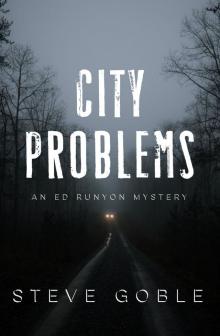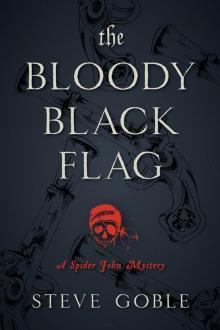- Home
- Steve Goble
The Devil's Wind Page 4
The Devil's Wind Read online
Page 4
After a long wait, his heart drumming a fast cadence the entire time, Spider saw Sam Smoke take up his previous spot. Spider sighed and waved to Odin, who clambered down, knife clenched in his teeth. Odin perched again in his previous spot and put his dirk away.
“Maybe he just went to refill his pipe,” Spider said, putting away his own weapon. “Tell me the rest of your story.”
“They just played with Ed Pigeon, cats with a mouse. And we didn’t help.” Spider had never heard Odin speak so quietly before. “I ought to have done something, but . . . something about those men.” Odin turned his gray eye toward Spider. “There is more, Spider John.”
Spider looked below, where Abigail Brentwood gazed over the rail. Wind blew her hair in at least three directions, and sunlight reveled in it. Sam Smoke stood not twenty paces away from her, lighting his pipe and staring at the pretty blonde. He seemed at ease, master of all around him. He did not look up toward Odin and Spider.
“Tell me,” Spider said.
“After Pigeon stopped blubbering, Ned cut the bindings. Pigeon looked at his hands, all black and red and bloody, still smoking, still oozing, and the man could hardly breathe. He looked like he was screaming, but there was no sound, hardly any air. Sam and Ned whispered to one another, and laughed a lot. Then Ned ordered Pigeon bound around his waist and had him hauled up to a yard on a pulley. Men did it, too, figuring they’d be shot, or worse. Which is very fucking true.
“The poor soul dangled there above us, swinging in the wind, just like poor Dobbin but wrapped around the belly, not the neck, so still fucking alive, blood and pus dripping from his hands, tears pouring out of his face, pissing himself, and Ned and Sam laughing. Wicked Pete, too. They laughed. Ned stood under the man, catching the falling blood and piss in his hands and on his tongue, lapping it up. Then he stepped aside.”
Odin took a deep breath, then looked away again. “‘Drop him.’ That’s what Ned ordered next. ‘Drop him.’ And they did, else get shot by Pete and Sam. They just fucking dropped him. Pigeon fell from the yard and smacked the deck like a wet sack of wheat. We heard the bones break and the wind gush out of him, and saw blood spray out of him. But it didn’t kill him. God! It did not kill him! He kept moving. The idiot. Flopping. Like a fish tossed on the deck. Just flopping. So Ned ordered him hauled up again.”
Spider’s fingers brushed the hilt of his throwing knife, and he stared intently at Sam Smoke.
“Three times,” Odin said. “That is how many times they hauled him up, and dropped him to the deck, before he finally died. Finally, mercifully, died. Ned, Sam, Pete, all of them laughing at every drop, every new splash of blood. All because Ed Pigeon didn’t carry wood fast enough to satisfy Ned Low.”
Odin turned his gray eye back to Spider. “I ain’t proud. I should have helped that man, should have risked getting shot, should have pulled a knife on the whore sons, but I didn’t. I didn’t. I do it in my fucking daydreams, I do it in my fucking nightmares, but I did not do it then. I’ve done some crimes, but that is my worst.
“We sailed back to Lowther, and when George divvied up his little fleet again I went off with Barlow and counted myself lucky to be far away from Ned Low and Sam Smoke and Wicked Pete Reese. The fucking inhuman bastards.”
“And now Sam Smoke is here,” Spider said. “And maybe Ned Low is in these waters.” He scanned the harbor again.
Odin nodded. “Maybe.”
Spider had dreamed of freedom, but he was still sailing the devil’s wind. Maybe the devil’s wind was the only wind there was.
“We can’t exactly tell Cap’n Brentwood about this bastard, can we?” Spider sighed. “He’ll start asking all kinds of embarrassing questions. ‘How do you know this man Sam Smoke’s a pirate?’ he’ll want to know. He’d ask Sam a lot of fucking questions, too. And I suppose Sam Smoke would tell a few tales in return.”
Odin nodded. Captain Brentwood had accepted the assurances from Spider’s tavern master friend and decided not to ask a lot of questions about their past. The captain struck Spider as a decent and trusting soul who would assume the best in a person as long as he could, but he would not ignore accusations made out loud. If Odin talked of Sam Smoke’s piracy, Sam surely would do likewise regarding Odin. And that would, soon enough, lead to speculation about Spider and Hob.
They could not afford that risk, not with a naval escort nearby, not with their escape still the talk of Port Royal, not with New England and Em and little Johnny almost within reach.
“Talking would be foolish,” Odin said. “I say we kill him.”
“A bit rash, aye?” Spider scolded. “Remember, we’ve become honest.”
“I honestly think we should kill him,” Odin replied. When he saw Spider’s jaw gape, the lone eye widened. “Ha!”
Spider was glad to see a small spark of Odin’s usual nature return; apparently, telling his story had helped ease his spirits, if only a little. “Has Sam seen you aboard? I mean, up close? I am not sure if he was staring at you or at me just now, to be honest.”
“I do not believe so,” Odin said. “I have kept my distance. But I can’t hide from his sight forever.”
“Certainly not.” Spider swung onto the ratlines. “Had you lost the eye when you knew him?”
“No,” Odin said. “And I went by my own name then, too.”
Spider blinked. “What is your own name?”
Odin shook his hideous head slowly. “Ain’t telling you that.”
Spider nodded. “Fair enough. Do you think Smoke might know you if he saw you now?”
“I do not know,” Odin said. “It was a long time ago, and I was prettier then. But I’d rather not chance it.”
Spider sighed. “Well then, if he hasn’t seen you yet, and might not know you if even he does, that means I have time to come up with a plan that won’t get us chucked in the brig or dancing on the gallows.”
Spider started to climb down, then stopped to give Odin one last look. “But if I can’t devise something smarter, perhaps Sam Smoke vanishes in the night. Men fall off ships all the time. It can be another great mystery of the sea.”
4
Spider dropped nimbly the last three feet to the deck, turned, took one step—and fell on his ass to avoid the screeching yellow-and-white blur flying at his face.
“Thomas, damn and blast ye!” Little Bob Higgins hurled a belaying pin at the chubby cat. Thomas, however, had already scrambled neatly out of range, and the pin rebounded from the ratlines and glanced sharply off Spider’s shoulder.
“Fat little bugger!” Little Bob, all three feet of him, stepped past Spider as if to chase the ship’s cat up the ropes. Spider grabbed Bob’s ankle, gave it a sharp twist, and sent the man tumbling hard to the weather deck. Spider did not particularly care about the cat—he distrusted the creatures, placing them almost as low as birds in his esteem, and wondered how in the hell this one had managed to follow him from the sinking Red Viper to the frigate Austen Castle and now to Redemption—but he had even less love for Little Bob Higgins.
“Damn and blast!” Bob rolled onto his back, hands on his bruised, bald scalp, amid an uproar of laughter from the men on deck. Spider rose, dusted off his hands, and said, “Those pins are not for throwing about, Bob. Beware, or I’ll stuff you into a keg and set you adrift. I suspect I’d get a dozen volunteers to help me.”
That drew a rowdy chorus of assent.
“Damn your arse, John Coombs.” Spider almost startled; in the heat of the moment, the assumed name caught him off guard.
“Just be sure you give me leeway,” Spider said curtly as Little Bob rose. “I have never liked you, Bob, you fucking fopdoodle.”
Spider bent to pick up the belaying pin, but kept an eye on Bob. The short man had an equally short fuse. But Little Bob kept his distance as Spider handed the pin to a seaman and asked him to put it in its proper place.
“I say damn and blast ye, Coombs.”
Spider grinned. “I’ll break your neck like k
indling, Bob, if you push me.” Spider picked up his hat.
Crewmen laughed, with one or two calling curses down upon Little Bob and at least one cursing the cat. “Where’s Mister Wright? He may want to lay a bet on this,” someone called.
Spider caught sight of Sam Smoke, standing in the back but tall enough that his face could be seen easily, watching with amusement. Up close, the man’s hard blue eyes cut through the tobacco haze that swirled beneath the brim of his hat. Spider thought the devil might look very much like that, peering through the brimstone smoke.
A stern, but calm, voice cut through the din and brought Spider’s attention back to the row with Little Bob.
“That is quite enough.” Captain Josiah Brentwood strode forward, commanding attention with his six feet of height and hard gray eyes. His hair, long and just as gray, waved like a flag in the breeze, and he stood with his hands locked behind his back and his jaw working back and forth as he looked about. After the men quieted, almost instantly, the captain confronted Little Bob. “Have you been after Thomas again?”
Upon hearing his name, the cat appeared from somewhere above, hurtling himself at the captain. Brentwood, clearly expecting the cat’s maneuver, unclasped his hands and deftly caught the animal. He stroked Thomas gently and fixed his icy eyes on Little Bob. “Well?”
“He stabbed my nose,” Bob said, staring at the deck. He pointed to his nostrils, both of which had been sharply pricked. Bob looked like half a man standing there next to the lanky captain.
“I’ve told you to keep your nose away from Thomas,” Brentwood said quietly. “Thomas is a very good cat. He won’t bother you if you don’t bother him.”
“He hates me! Little bugger!”
“Enough!” It was the first time Spider had heard Brentwood raise his voice, and it was impressive and shocking, like thunder from a clear sky.
No one else spoke, but a new player pushed his way through the crowd. “I am sorry, Captain,” said Nicholas Wright. The master sucked air into his broad chest, and his eyes widened with fury. “I will take care of this, sir. Should not have let it happen.” His light blue eyes fixed on Little Bob, who ducked his head as though dodging a blow.
“It is all well, Mister Wright,” the captain said. “I do not expect you to be in all places at once. Nor do I wish to delegate all the unpleasant duties to you.” Spider didn’t think the captain’s expression quite matched the conciliatory words, but Wright nodded and seemed pleased. Brentwood turned his attention back to Little Bob.
“I gave you a chance, Bob,” the captain said. “I doubt any other captain would have done so. You are a lazy hand, and a miserable cad. As unpleasant as a prickly rash. This is a good cat, bad mouser, but a good cat. Minds his own business. You should mind yours. Are you not supposed to be stowing goods for our passengers?”
“I was, Cap’n, honest; then this little bugger . . .”
“Halt!” Brentwood sighed, scratched Thomas behind the ears, then released the cat. Thomas dropped nimbly to the deck and wandered off, seeking shade. “Bob Higgins, I release you from my crew. Mister Wright will pay you what you’ve earned, if anything. Don’t pay him if he hasn’t worked, Nicholas.”
“Aye, sir.”
“Then, Mister Higgins, you will get off my ship.”
Little Bob’s eyes bulged. “No, Cap’n, no! Over a damned cat?”
“Get off my ship,” Brentwood said slowly and quietly.
“I need to get to Boston, sir, please.” Bob raised his hands, imploring the captain with broad pleading gestures and a big smile. The effect of the smile was ruined by six or seven missing teeth. Bob turned to Wright when his pleading failed to break the captain’s resolve. “You do not know what it means to me, sirs. I will behave, I swear.”
“Get off my ship,” Brentwood said, “or be thrown off.”
“I’ll see it done, sir,” Wright said. His tone, low but hard as good oak, left no doubt that he would.
Bob’s smile vanished, and his blue eyes grew cold. “Damn ye! God damn and blast ye!”
“Be on the next tender that leaves, or you will swim. As for you, John”—the captain turned toward his carpenter—“what is your role in this?”
“None, sir, other than to be pummeled with a belaying pin Bob threw at the cat.”
“I heard a mention of breaking a neck.”
“Aye, sir,” Spider said. “It was a hot moment. Wouldn’t have actually hurt him, sir, not unless my life depended on it.” Spider tried to sound sincere and wondered if he’d succeeded.
“You bring such concerns to me, John, or to Mister Wright, and break no necks. We shall have no fighting aboard Redemption. You work hard, and know your trade, but that gives you no leave for fighting. Do you understand me, John?”
“Aye, sir.”
Captain Brentwood’s eyes turned toward the mast, and his gaze followed it upward into the rigging. “Redemption knew too much fighting in her day. Too much neglect. A carrier of brigands and thieves.” He looked at Spider. “Those days are behind her. She is lovely, John, and you deserve as much credit for that as anyone. You focus on your duty, and let Mister Wright and I discipline the hands, if it should become necessary.”
“Aye, sir.”
Captain Brentwood turned and headed slowly to his cabin aft, his head down and his hands once more clasped behind his back. After three steps, he let out a heavy sigh and quickened his pace. Spider thought he caught snatches of a hymn, hummed in the captain’s low voice.
Little Bob walked, grumbling, toward the hatch that led below. Wright dogged him all the way.
The crewmen went back to work, and Spider, relieved to have escaped the captain’s wrath, thought to go find himself a tot of rum, or maybe two. But he caught a glance of Abigail Brentwood, who sat on a barrel by the starboard rail, and he froze. Across her lap was a wooden contraption, long and slender, and she tapped it with her fingers. Her head swayed slowly as she did so, and her eyes were closed. Spider noted her swaying seemed to be in time with the ship’s gentle rocking, and her smiles coincided with each roll to port. Her hair was caught up in a ponytail, which tossed about on the breeze.
She is breathtaking, Spider decided, and then he silently asked both Em and the good Lord for forgiveness for noting that. He was about to turn away, but when Abigail Brentwood opened her fine blue eyes, they were aimed directly at him, and she smiled. He gawked foolishly just long enough to realize simply walking away was no longer an option. He suddenly wished he owned all his fingers and all his teeth, and perhaps a razor and some soap. He lamented the fact he had not yet had a moment to cut off most of the wretched beard.
“What,” he said, pointing at the device in her lap after a couple of awkward heartbeats, “have you there?” He hoped he did not sound as foolish as he felt.
“This?” She tapped fingers on the device quickly, then lifted her hands and spread them wide. “It mimics a clavichord. Isn’t it wonderful? Mr. Fox built it for me.” Her accent was refined, and spoke of London, or at least the London of Spider’s imagination. He’d never been there.
“The same gent who built your father’s case clock?” Spider had admired the tall, slender clock tucked into the captain’s cabin ever since it had come aboard. The chains and pendulums and gears that made it work were tucked away in a chest—there simply was no point in trying to operate the clock at sea on a rocking ship, the captain had explained, much to Spider’s disappointment. But the case itself was impressive enough, formed of good oak and trimmed with walnut by an artist who had a way with pastoral images. Leaves and flowers, deer and rabbits, hawks and doves, all were captured in loving detail, and varnished with care by an expert hand.
“Indeed,” Miss Brentwood said. “Mr. Fox is most handy and clever. This keyboard, he tells me, is full of hinges and clock springs. The keys all rise again after I push them down, just like the real thing. He made it so I could keep up my practice while we travel. Isn’t it wondrous?”
“Yes, very cle
ver,” Spider said. He slowly walked toward her, and now he could see the keys up close. Her fingers nimbly danced across them, and they popped up afterward.
“I must hear the music in my head, of course,” she said, “but I am getting accustomed to that. And I am composing little songs, too, writing the notes and chords in my journal. I shall have an entire songbook by the time we reach Boston. Do you play?”
“Uh, I have scratched at a fiddle once or twice,” he said. “I think the fellows listening might have preferred hearing music in their heads.”
Abigail laughed. Spider blinked; the sound reminded him of Emma. “It is as fine a thing as that clock.”
“Mr. Fox is a dear man,” she said. “Since my mother died, Father has been . . . not himself. Mr. Fox made a gift of the clock, knowing Father admired it. I am sure Mr. Fox might have sold it for a handsome price, but he says that is not why he made it.”
“Why did he make it, then?”
“To see if I could.” Spider turned to see a man wiping his forehead with a dingy kerchief. Once finished, he pulled the cloth away to reveal brown eyes and a friendly smile, arranged around a nose that might have passed as a small potato. Brown hair was neatly combed back and pigtailed, but beaded with sweat. “I am Rufus Fox,” he said, extending a hand to Spider after bowing to Miss Brentwood. Spider guessed the man’s age at perhaps twice his own, fifty years or so.
“John Coombs, ship’s carpenter.” Spider took the proffered hand and shook it firmly.
“Carpenter!” Miss Brentwood clapped her hands together. “Why, you built my sitting room, did you not? The window is such a nice thing! Thank you!”
Spider nodded and wondered if he blushed. “Aye. Not a real window, just a frame and a rod, you know, but . . .”
“But I hung curtains on it, and it looks pretty just the same,” she said. “Oh, I am happy to have made your acquaintance, Mister Coombs!”
“As am I,” Fox said. “Carpenter!” The man’s face ignited with interest. “Oh, I am happy, sir, happy indeed. And do I hear a bit of Boston in your accent, sir?”

 City Problems
City Problems The Bloody Black Flag
The Bloody Black Flag A Bottle of Rum
A Bottle of Rum The Devil's Wind
The Devil's Wind